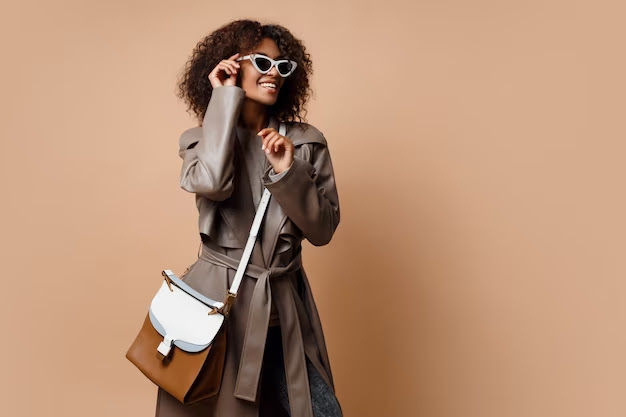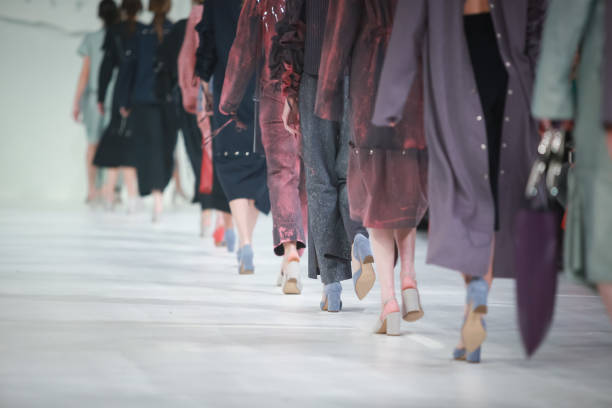How Music Influences Fashion Essay
If fashion is the body's canvas, then music is the soul's voice. Throughout history, these two expressive forces have danced together in an ever-evolving tango of rhythm and style. When we dive into the colorful world of fashion and music, we witness a relationship that’s fluid, dynamic, and most importantly, fun. Let's journey through this melody-infused runway and explore how music has played an instrumental role in shaping fashion trends.

The Swinging 60s: Rock 'n' Roll & Mini Skirts
The 1960s brought us the Beatles,
the Rolling Stones, and a new sense of rebelliousness. As rock 'n' roll
dominated the airwaves, fashion started to mirror the music's free-spirited
nature. Think leather jackets, skinny jeans, and of course, the revolutionary
mini skirt. These weren’t just clothes; they were statements of youthful
defiance.
Disco Fever: Sequins, Platforms, and Flares
Enter the 70s, and the disco ball
began its reign. The glittering world of disco demanded attire that matched its
shimmering beats. Sequined dresses, flared pants, and platform shoes became all
the rage. The higher the platforms and wider the flares, the closer you felt to
the disco gods.
80s Pop & Punk: Bold, Bright and Wild
With icons like Madonna and the
Sex Pistols, the 1980s was a time of eclectic music genres, and fashion didn’t
fall behind. Vibrant colors, oversized jackets, and chunky jewelry dominated
pop culture, while the punk scene introduced torn jeans, leather, and an
attitude to match.
90s Hip-Hop & Grunge: Baggy Jeans Meet Flannel
The 1990s was a melting pot of
styles. Hip-hop culture popularized oversized tees, baggy jeans, and baseball
caps, with artists like Tupac and Aaliyah setting trends. Simultaneously, the
grunge movement, with bands like Nirvana leading the charge, made flannel
shirts and rugged boots the uniform of a generation.
21st Century: A Blend of Past & Present

Today, the interplay between
music and fashion is more diverse than ever. From the glamour of pop divas
donning haute couture to indie artists embracing vintage thrift-store finds,
the lines have blurred. Festivals like Coachella have become as much about fashion
statements as they are about music.
K-Pop, a global phenomenon,
brings an explosion of styles, colors, and trends with every music video
released. On the other side, the rise of Billie Eilish introduced a new era of
anti-fashion, where oversized, androgynous, and often neon outfits challenge
conventional style norms.
Dressing to the Beat
It's not just about clothing;
it's about identity. Music provides a sanctuary, a place where we find
ourselves and connect with others. Similarly, fashion is an extension of our
personalities, a visual representation of our tastes, beliefs, and
affiliations.
There's a simple joy in syncing
our attire with our playlists. Whether you're donning neon like an 80s pop
queen, embracing cowboy aesthetics inspired by the country tunes, or wearing
monochrome to resonate with your favorite indie song, your part of a tradition
that’s been alive for decades.
Have you ever been so lost in a
song that you felt the urge to match its rhythm with your attire? That fluttery
feeling of wearing a flowy dress while listening to a soft acoustic tune or the
invincible sensation of donning a leather jacket with rock beats blaring in
your ears? Welcome to the world of "Dressing to the Beat."
Tuning in: Fashion's Own Playlist
From the dawn of music history,
our clothes have been influenced by the songs we cherish. But it’s not just
about emulating our favorite artists; it's about syncing our external
appearance with our internal soundtrack.
Jazz & The Roaring
Twenties: Picture the Jazz Age. As Louis Armstrong’s trumpet resonated
through smoky bars, flapper dresses twirled, capturing the essence of
liberation and merriment. Their fringes and beadings danced effortlessly to the
rhythmic beats, as if the melodies had sewn themselves into the fabric.
Rock 'n' Roll & The Rebel
Attire: Fast forward to the 50s and 60s, when rock 'n' roll was more than
music; it was a revolution. And with it came the leather jackets, tight jeans,
and iconic white tees. Dressing to the beat of Elvis or the Rolling Stones
meant embracing a rebellious streak.
Rave & Neon: Enter the
90s rave scene. Psychedelic trance and electronic beats transformed wardrobes
into neon paradises. Glowing accessories, holographic patterns, and chunky
shoes were not just fashion choices; they were armor for all-night dance
warriors.
Feeling the Vibe: A Personal Symphony
Music is a reflection of our
emotions, and so is fashion. Each morning, our wardrobe choices might be
influenced by our playlists:
- Feeling the blues? Maybe a cozy, oversized sweater
and soft leggings are your go-to.
- Pumped up with pop hits? Bright colors and bold
patterns might be the choice of the day.
- Mellowing out with some indie folk? Perhaps a boho
dress and a pair of comfy sandals.
The Concert Aesthetic: A Dedicated Ensemble
Ever noticed how there's almost
an unspoken dress code for different concerts? Go to a country music festival,
and you'll see cowboy boots and hats aplenty. At a punk rock concert? Expect
studded leather and band tees. Music lovers inherently know how to tune their
outfits to match the ambiance of a gig, making the experience all the more
immersive.

Beyond Threads: Accessories with a Beat
And it’s not just clothes. Think
of the headphones you choose, the guitar strap, or even the patches on your
backpack. They're influenced by your musical taste, bridging the world of sound
with the tangible.
Conclusion
The bond between music and fashion is undeniable. They influence each other, grow together, and often
mirror the societal changes and sentiments of their times. It's a delightful
dance that we all participate in, consciously or not. So, the next time you
pick an outfit or tune into a song, remember, you're not just enjoying one;
you're celebrating both!
Dressing to the beat isn’t just about mimicking music
genres; it's about harmonizing our external selves with our inner vibes. It's a
beautiful dance of threads and tunes, where every chord finds its color, every
beat its texture. So, the next time you pick out an outfit, let your playlist
be your stylist. Dive into the rhythm, feel the melody, and let your fashion
sing.



Comments
Post a Comment